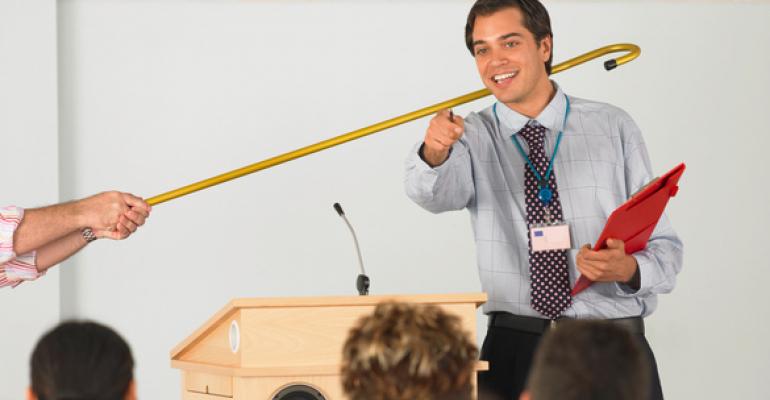Fair warning: Rant ahead!
Not long ago, I watched a talented speaker (and friend) Patrick Henry deliver a great presentation called “Be Re-memorable.” He’d worked on it for nine months, and he really captivated the audience—he owned the stage because of his creative and carefully crafted content and the customized songs that he wrote for the occasion. He made us laugh as he made us think.
So what’s there to rant about? This: Patrick was the fifth speaker that morning (too many, to be honest), and my friend didn’t start until he was supposed to finish. That is simply unacceptable.
The poor audience was tired, and biology was reminding us we needed a break. Our attention spans were exhausted. It wasn’t Patrick's fault that the program was running late, but he was the last speaker of the day and it could have been easy to blame him for the discomfort.
It’s easy to blame the speaker. It’s easy to blame the meeting planner. It’s easy to blame the lack of an emcee. But the blame is with all of us.
We’re All in this Together
Hosting events is a partnership. It’s an agreement between meeting professionals, main-stage speakers, AV crew, emcees, breakout speakers, hotel staff, and audience members. Everyone needs to be focused on creating a memorable experience that keeps audiences coming back year after year.
As a professional speaker, I have sometimes offered to shorten my presentation when the proceedings start running long. Whether the meeting planner took me up on it or not, the offer is appreciated nonetheless. However, here’s what I believe are the responsibilities of an event's constituents:
• The emcee’s major responsibility is to keep the event flowing (and warn your speakers what will happen if they go over).
• The event organizer needs to have—and communicate—contingency plans in case to everyone involved if the event starts running late.
• The speaker needs to know it is never okay to go over the allotted time. Period, end of story. It’s selfish and unprofessional.
• If the program is running long and meeting planner tells the speaker to take all of their allocated time, the speaker should inform the audience that the end of the presentation will be later than indicated on the agenda.
• Audience members need to complete surveys to share feedback with meeting planners about their experiences.
7 Solutions (Besides a Hook)
What can you do if your speakers go overtime? I asked a group of other professional speakers, and got some great solutions. If you aren’t allowed to use a big hook (I am in favor of this), here are tactics to consider:
1. Use a professional emcee who is responsible for meeting flow and timing.
2. Ask the emcee to brief every speaker on what will happen if they go overtime.
3. Instruct the AV crew to silence the microphones if someone goes over the allocated time.
4. Ask the AV crew to start playing music... hey it works at the Oscars!
5. Use a timer the speaker can see.
6. Use a timer the audience can see. (This is controversial and powerful for short talks.)
7. Walk on stage and asking your audience to give the speaker a round of applause—yes, even if they aren’t finished.
I implore meeting professionals to reconsider scheduling so many speakers in a row, and to remember when building their agendas that audiences need that biology break. A better event plan takes a less-is-more approach that considers the audience’s attention span and desire to get up and move.
An idea to put into play: Before you finalize your next speaker contract, can you add a clause about staying on time? Can you empower your emcee to remove someone if necessary? Can you brief your AV crew on what you want them to do if instructed by you or the emcee when a speaker goes overtime? Let’s keep all our events on time and stop stealing minutes from each other.
At meetings, time is the most valuable commodities we have. Everyone wins when we honor it at a professional level.






